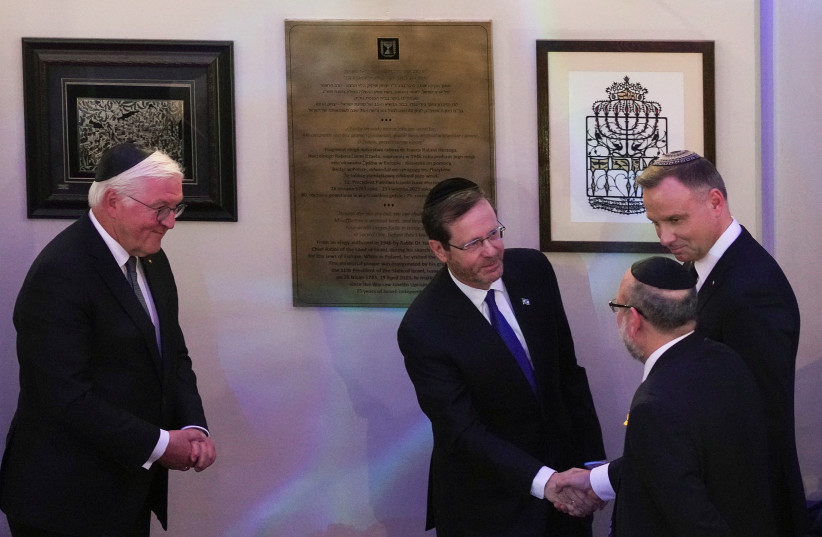Close one’s eyes and imagine the life of the Nozyk synagogue in pre-World War II Warsaw, President Isaac Herzog said as he stood in the sanctuary of the 121-year-old building.
One can see “this synagogue, on the holidays, during Shabbat prayers, at kiddush receptions, on communal days of joy—families upon families, parents, children, grandmas and grandpas, aunts and uncles,” Herzog said.
Then, he explained, it was all obliterated. It was all erased by the Nazis, who snuffed out the lives of the worshippers from this building as well as most of Poland’s 3.5 million Jews.
Herzog spoke Wednesday at a special ceremony at the small yellow two-story building located in the heart of what was once Jewish Warsaw. He was joined by his Polish and German counterparts Andrzej Duda and Frank-Walter Steinmeier, who accompanied him on a number of other stops during the one-day visit to mark the 80th anniversary of the Warsaw ghetto uprising.
The largest concentration of Polish Jews was in Warsaw, Herzog explained, describing how there were five Yiddish theaters as well as dozens of Jewish newspapers, hundreds of yeshivas, synagogues, youth movements, sports clubs, libraries, clubs, schools, charity groups and hospitals.

Herzog's memories of Poland
Portions of his family, Herzog said, was originally from Poland, including his grandfather Rabbi Yitzhak HaLevy Herzog, who was the Chief Rabbi in Ireland and then Mandatory Palestine as well as the state of Israel.
In 1946, Herzog said his grandfather came to Poland and stopped at the Nozky synagogue, the only one in Warsaw to survive the war.
He “stared into the void, into smoldering piles of silent stones: a testament to the terrible destruction,” Herzog said.
All that was left was “dust and ashes,” Herzog described adding that, “the chilling silence told the whole story.”
In this synagogue “a survivor of a magnificent millennium-old Jewish history on Polish soil .. huddled a few dozen souls, “brands snatched from the fire” (Isaiah 7:4), at a tear-drenched occasion,” Herzog said.
“Here, in this place, a bloodstained Torah scroll was handed to my grandfather by the survivors,” Herzog described.
The former cantor of the Great Synagogue of Warsaw, Moshe Koussevitzky, recited an amended version of the Jewish prayer for the departed written by his grandfather, Herzog said.
To underscore the shifting tides of history, Herzog said that he wanted to recite that same prayer as the President of the modern state of Israel and the proud scion of a “glorious Jewish family with roots all across Poland.”
Then he uttered the prayer: “O God, who art full of compassion, who dwellest on high, grant perfect rest on the wings of the Divine Presence, on the pinnacles of the holy and the pure, which shine like the radiance of the firmament, to the souls of the six million Jews, victims of the Holocaust, who were killed, suffocated, burned, and martyred by the German murderers and their accomplices from other nations.”
Since then time has wrought deep changes, the testament to which can be seen by the presence in the ceremony of the German and Polish presidents, Herzog said.
With this partnership, he said, reflects the importance of standing “together against evil in all its forms.. to fight together against hatred, antisemitism, and racism, against any desecration of human dignity, and against anything that would menace us as a life-affirming, peace-loving human society.”
“I pray that the deep commitment that the three of us express by coming here together today will underpin a powerful alliance that will bring value to our peoples and the whole of humanity,” Herzog said.
